150 Union Members Turn Out For 2024 Labor Lobby Day; Build Support for Labor Legislative Priorities

PHOTO: Members of Maine State Nurses Association, UMaine Graduate Workers Union-UAW, Machinists S-7, Ironworkers 7 & Maine Service Employees Association meet with Senate Majority Leader Eloise Vitelli & Assistant Senate Majority Leader Mattie Daughtry.
More than 150 workers gathered at the Statehouse in Augusta on Thursday to talk with legislators about key pro-worker issues as part of the Maine AFL-CIO’s annual Labor Lobby Day.
Throughout the day, workers discussed labor bills with their Senators and State Representatives, met with House and Senate leadership and attended and testified at a committee public hearing on an important federal worker bill (LD 2113) and a work session on a bill (LD 2121) to close the state employee pay gap and improve recruitment and retention in state government. Senate President Troy Jackson held the door open to let workers in the Cross Building in the morning and gave a rousing speech to attendees. Union members also briefed workers about our labor priorities and how to lobby our elected officials. A group of University of Maine Graduate Workers (UAW) joined in the lobbying effort and circulated a petition to lawmakers urging the University to bargain a fair contract in good faith.
The group — which included members of the Maine’s AFL-CIO’s 200 union affiliates — shared its 2024 Labor Legislative priorities at a Labor Lobby Day press conference.
“We are here today because we believe that no matter where you work or what your race, gender or country of origin are, all workers deserve dignity, living wages, safe working conditions, quality health care and retirement security,” said Cynthia Phinney, President of the Maine AFL-CIO. “Our Working Families Legislative Agenda will improve wages and working conditions for workers in health care, the paper industry and the public sector as well as raise standards for all working families in Maine.”
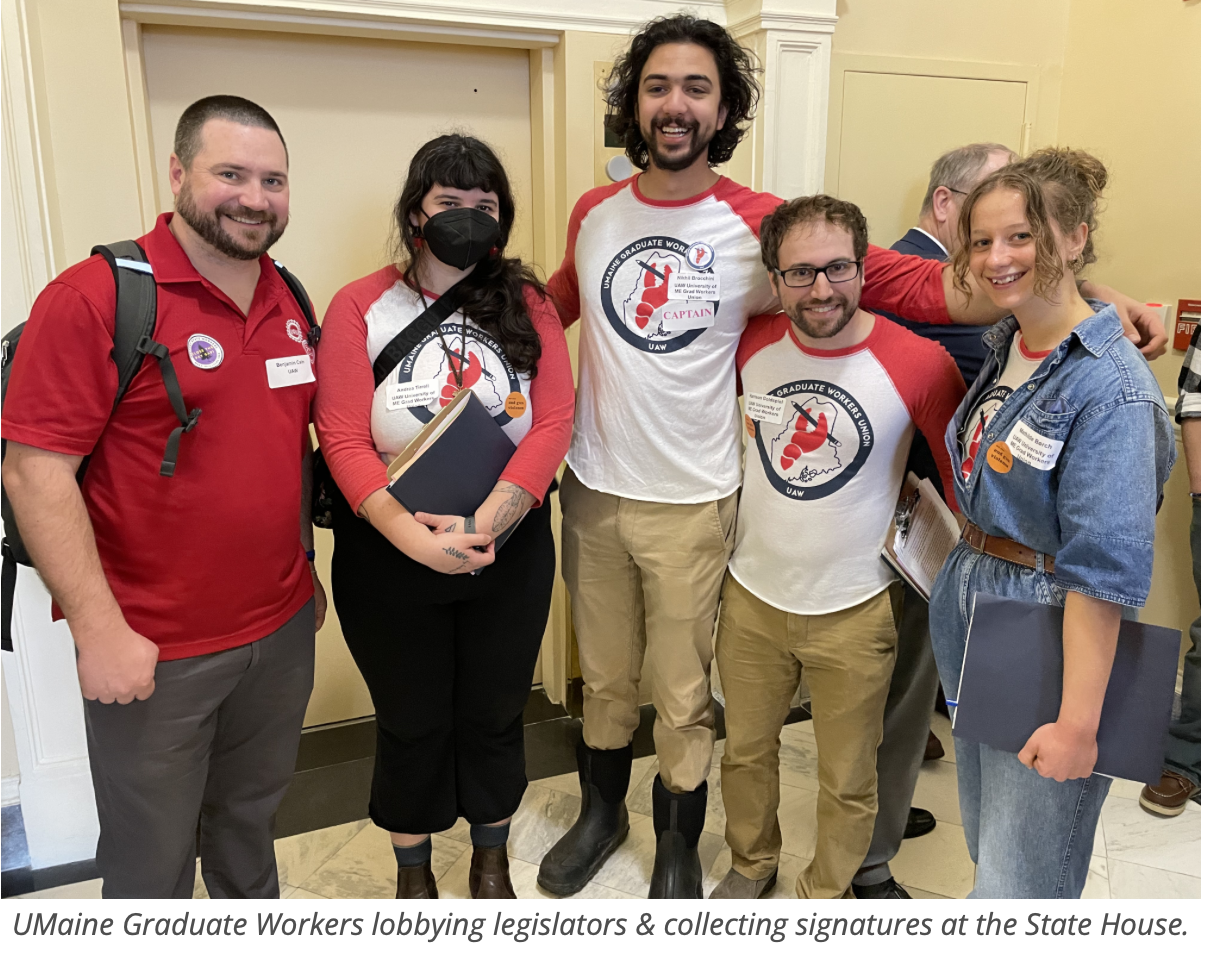
After years of attending our Labor Lobby Days, IBEW 1837 member and newly elected State Representative Matt Beck (D-South Portland) addressed attendees and encouraged them to follow his lead and run for office. Brother Beck is the third member of IBEW 1837 currently serving in the Maine Legislature.
“If I can do it, you can do it! We need more working class voices in the Legislature,” he said.
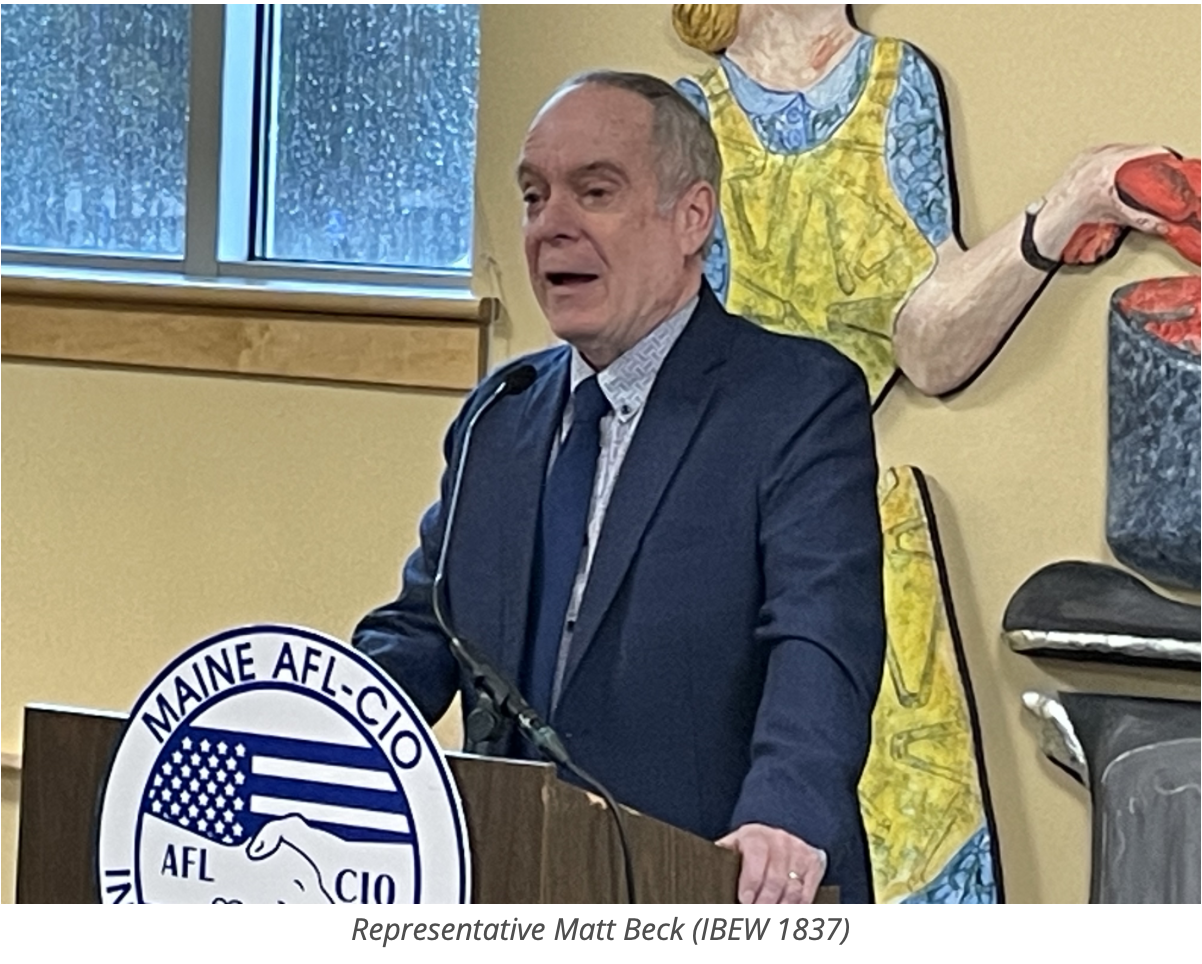
LD 2113: Supporting Federal Employees

A number of workers from Portsmouth Naval Shipyard made the trip to Augusta to support LD 2113 (Sen. Troy Jackson), An Act to Provide Relief to Federal Employees Affected by a Federal Shutdown. The bill would allow workers who are furloughed or required to work without pay during a federal shutdown to qualify for state-backed, no-interest loans. The workers testified in support of the measure in the Health Coverage, Insurance & Financial Services Committee.
“Every time the federal government faces the threat of shutdown due to lack of approved funding by our legislators in Washington DC, federal employees in the state of Maine are left to fear whether they will see a paycheck until the funding is approved,”said Alana Schaeffer, President of the Metal Trades Council at Portsmouth Naval Shipyard and President of her union, Plumbers and Pipefitters Local 788. “The 6,000+ hard-working men and women at Portsmouth Naval Shipyard — many of whom are tradespeople such as electricians, pipefitters, general helpers, warehouse workers, and machinists — are still required to come to work every day to perform their vital mission of overhauling our nation's fast attack submarines so they can continue their mission, while not knowing if they are going to be able to pay their bills that month, put gas in their vehicles to get to work, pay for child care, or feed their families until a budget is passed. The Portsmouth Federal Employees Metal Trades Council stands in strong support of LD 2113 and trusts that legislators in the state of Maine will stand behind these workers who remain dedicated to the the defense of our nation, regardless of the political climate in Washington, DC.”
The Portland Press Herald ran a great story about the public hearing for the bill and quoted Portsmouth Naval Shipyard Machinist Josh Johnson (IAM 836) who told committee members about what it was like as a single father working 35 consecutive days in 2018 and 2019 without a paycheck during the federal shutdown.
“Historically, we typically do get (back pay). But when you’re talking about weeks without a paycheck, it’s weeks of having to juggle which utility are you able to pay for month-to-month? Do you choose your rent, do you choose your food?” he said.
Other union members testifying in support of the bill included Jamie Critchley (IBEW 2071), Mark Vigliotta (IAM 836 & Maine IAM Council), Bill Reiley (AFGE 2617), Chris Rogan (Painters 1915), John Portela (ret. IAM S6 & Maine IAM Council), Gabe Pedreira (AFGE) & Steve Santiago (Food AND Medicine & UAW 2320).
USW Members Back LD 1794 to Limit Forced Overtime
Union members stood in solidarity with paper mill workers, who are increasingly being forced to work longer hours of mandatory overtime with multiple shifts in a row. LD 1794, An Act to Enhance the Predictability of Mandated Overtime for Pulp or Paper Manufacturing Facility Employees (sponsored by Senate President Troy Jackson), would limit employers from imposing mandatory overtime on mill workers while preserving their right to voluntary overtime.
John Perry IV, Labor Representative for the United Steelworkers and former President of USW 900 at Rumford mill, got the idea for LD 1794 after attending Labor Lobby Days and realizing he could do something about excessive forced overtime.
“When this bill was first being discussed there were mill workers working 24-hour shifts and back-to-back 18-hour shifts. Some workers had not had a day off in months. Those who refused to work these grueling shifts were disciplined and sometimes even terminated,” said Perry.“Mandatory overtime has put stress on many workers in the State of Maine and made it impossible to manage the balance between work and life. This has jeopardized our ability to manage child care, attend family events and our children’s extra-curricular activities. For over 150 years, workers have fought for the 40-hour work week and they shouldn’t have to fight this fight again. Workers deserve to have the right to refuse to work excessive mandatory overtime.”
According to the Maine Department of Transportation, studies have shown that going too long without sleep can impair one’s ability to drive the same way as drinking too much alcohol. Even being awake for 18 hours is the same as someone having a blood content of 0.05 percent. The National Highway Traffic Safety Administration found that drowsy driving was responsible for at least 91,000 car crashes, including 795 fatalities in 2017.
Nurses Lobby to Pass Enforceable Nurse-Patient Ratios in Hospitals
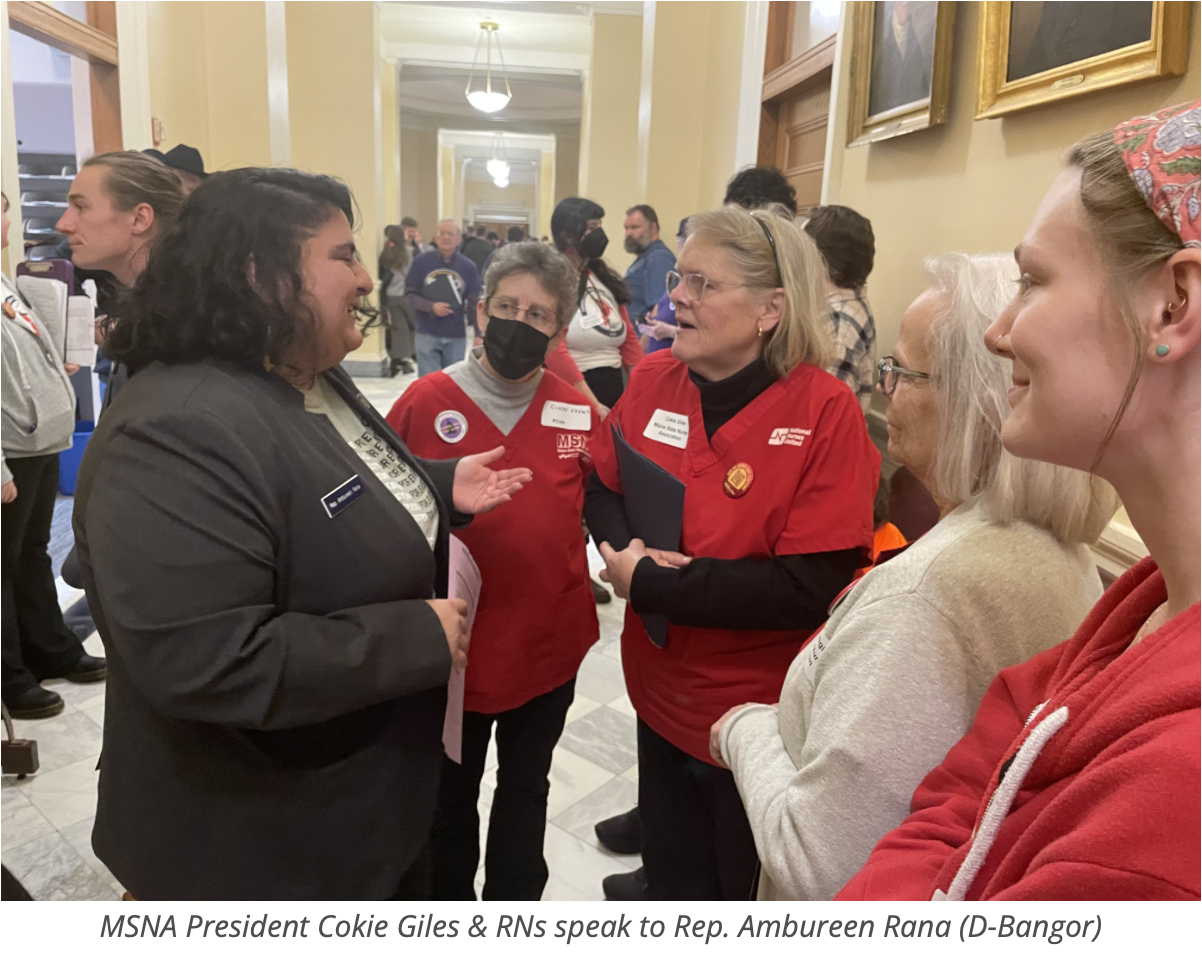
A number of members of the Maine State Nurses Association/NNOC attended Labor Lobby Day to support LD 1639, the “Maine Quality Care Act.” The measure, sponsored by Senator (and RN) Stacy Brenner (D-Cumberland Cty.), would protect patients and improve health care outcomes by setting minimum, registered nurse-to-patient staffing ratios.
“For nurses, the greatest way we can show our love and solidarity with the people of the state of Maine is to fight for reasonable and enforceable nurse to patient ratios! That means that hospitals will be limited in how many patients a nurse can be given on their assignment in any department on any shift in any hospital in the state of Maine,” said Kelli Brennan, a member of the Maine State Nurses Association and registered nurse at Maine Medical Center in Portland. “This would be a huge step forward for patient safety in our state, and it would be a huge improvement in the lives of bedside nurses. Our bill LD 1639, the Maine Quality Care Act, is based on decades of experience and research on the effectiveness of enforceable nurse to patient ratios, not only here in the U.S., but wherever patient ratios have been adopted anywhere else in the world.”
State Employees Urge Lawmakers to Close Pay Gap; Committee Advances Bill
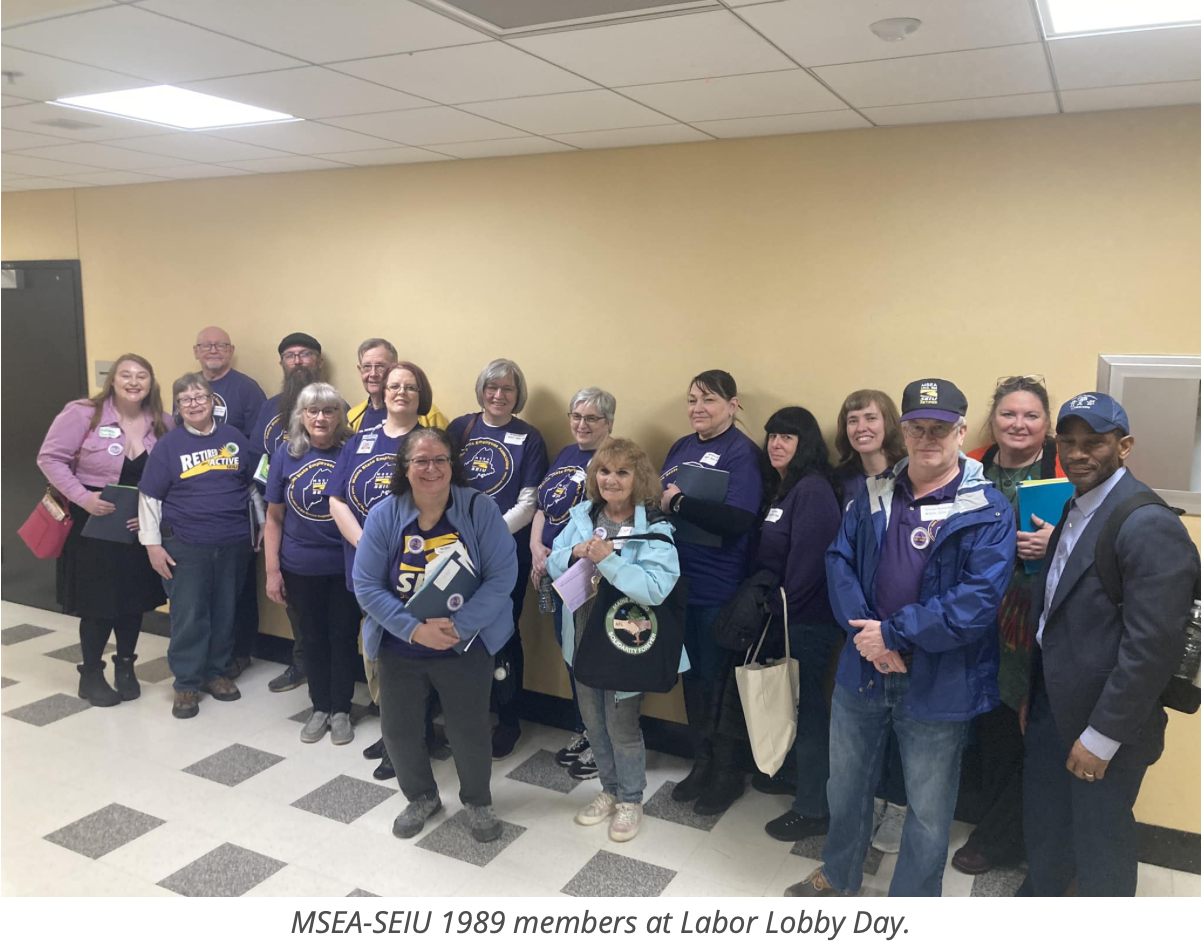
As the state continues to struggle to hire enough qualified employees, the Maine AFL-CIO and the Maine Service Employees Association (MSEA-SEIU 1989) are calling on the Legislature to pass LD 2121, An Act to Address Chronic Understaffing of State Government Positions, sponsored by Rep. Drew Gattine (D-Westbrook). This bill would provide $165 million in funding for a new compensation and classification system for state executive branch workers and boost their wages to compete with the private sector. Workers pointed out that the state’s annual budget surpluses are a direct result of it underpaying state employees.
Kevin Russell, an eligibility specialist for the Maine Department of Health and Services and Vice President of the Maine Service Employees Association, Local 1989, said that some of his coworkers are paid so low that they’re resorting to public assistance to support themselves and their families.
“Who else thinks it’s inexcusable that full-time workers have to rely on public assistance? And it isn’t just state workers. Some full-time workers at the Maine Community College System are paid so poorly they also receive public assistance,” said Russell. “State Government and the Maine Community College System should be leaders in making sure that all workers earn a living wage, but it’s been just the opposite. It’s a big disappointment that rather than acknowledging the problem, the administration has been claiming publicly there isn’t a pay gap anymore – all as they refuse to complete a compensation and classification study required by both state law and our union contracts.”
Members of the Maine Service Employees Association and other workers attended the work session for the bill wearing stickers that read “Close the Pay Gap! The Legislature’s State and Local Government Committee advanced LD 2121 on party lines with Democrats supporting the bill and Republicans opposing it. Now we need the bill to pass both chambers and the Legislature’s Appropriations Committee to fund the new compensation and classification system.
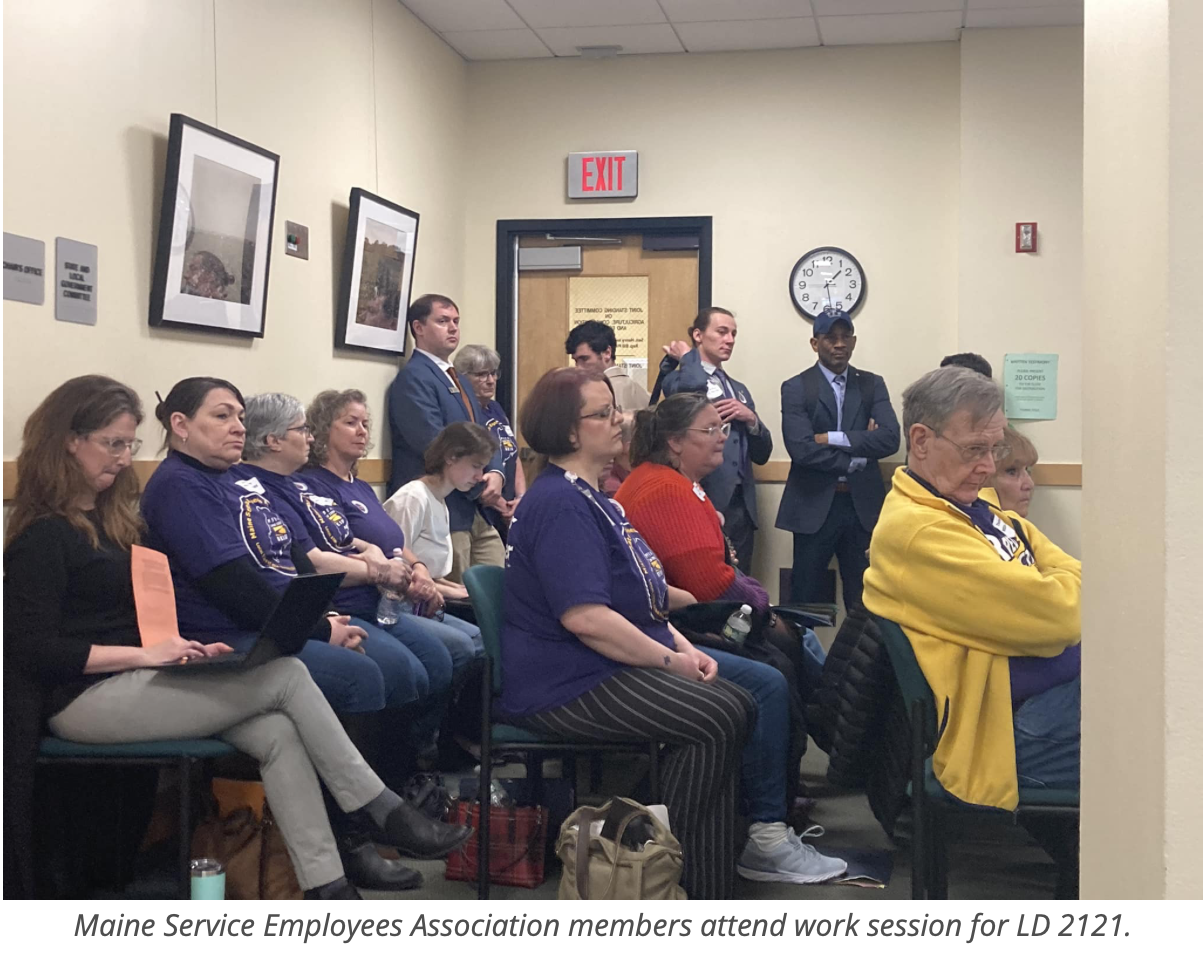
The new compensation and classification system would address the fact that two studies, one in 2020 and the other in 2009, show that state workers are underpaid by 15 percent, on average, compared to their public and private sector counterparts in Maine and New England. Staffing challenges have left state government with over 2,100 vacant positions. The recent record state budget surpluses have been a direct result of underpaying state workers and substantially understaffing quality services for years.
Farmworker Minimum Wage Bill Coming Soon!
Attendees also spoke with legislators in support of pending legislation to apply the state’s minimum wage to farmworkers. In the coming days the Governor will release a bill to apply the state minimum wage to farmworkers in Maine. The Maine AFL-CIO supports this upcoming legislation and looks forward to finally getting it into law this year.
“Farmworkers keep food on all of our tables. For too long they’ve been excluded from basic labor protections. We urge legislators to do the right thing and extend the minimum wage to Maine farmworkers,” said Matt Schlobohm, Executive Director of the Maine AFL-CIO.
